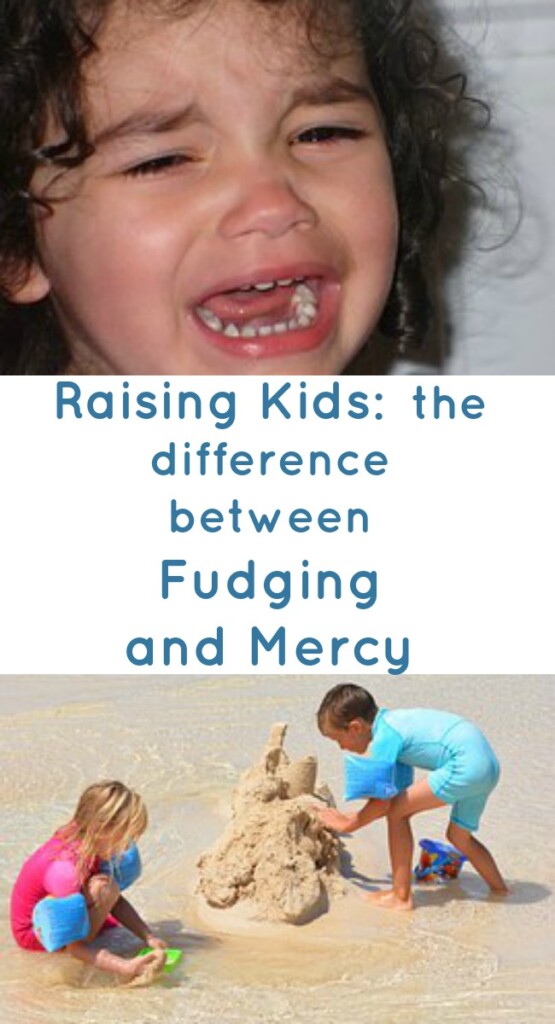Raising Kids: The Difference Between Fudging and Mercy

When parenting is especially hard and you’re not sure what to do with a defiant child, consider granting mercy¹.
Do it, not because he deserves it, because mercy isn’t deserved. Do it because we have been the recipients of mercy. As God grants us mercy when we least deserve it, we can model that to our children. It is a lesson well-learned.

My friend’s Lyme disease left her weak and unable to cope with normal duties. Her toddler son was usually obedient, but on this particular day, he did not stay inside as she had asked him to do while she went to the mailbox. Upon her arrival back to the house, she found him outside. His look told her that he knew he had disobeyed. She was exhausted; that walk to and from the mailbox took everything out of her and she just wanted to sit down and rest.
This mom had a dilemma. She was not physically or emotionally able to deal with disciplining him, but she knew he deserved and needed to experience the consequence of his defiance. Most certainly, she knew that if he “got away” with slipping outside the house once without permission, he’d be sure to do it again. The road going by their house was not a safe place for a wandering toddler. No, this was not safe for him to receive no consequence for his disobedience.
What to do? Ever the creative parent, she chose to seize that moment and give him mercy.
This exhausted but wise mom explained to her tyke that he had disobeyed, and therefore he deserved punishment. However, on this day and for this instance, she would show him mercy. She explained to her little guy what mercy means. “You deserve a spanking, but I am going to show you mercy and not give you what you deserve. This is what God does for us. What you did was wrong, but today I am going to show you mercy just like God shows to us.”
She didn’t ignore his infraction. She didn’t minimize the importance of obedience or the fact that he had willfully disobeyed. In granting him mercy, she recognized that what he had done was wrong (and could, eventually, become unsafe). For this instance, and for this time, he received mercy.

A child will feel more secure if he knows that he didn’t “get away” with his wrongdoing.
The boundaries have not changed and he must still obey even when he receives mercy for his infraction. Being given mercy does not give him permission to disobey the next time, or to continue to do what he knows he must not do. Granting mercy does not ignore what he has done. Mercy acknowledges the deserved consequence and then chooses to allow the guilty party to be free from that guilt without experiencing the consequence.
That is what God does for us, and therein lies the difference.

When we as parents (or teachers) fudge² on what our kids have done, we’re only giving them permission to continue to disregard the rules or requirements for a class. When our kids know we have seen and chosen to ignore what they have done or they hear us minimize the infraction to others (she was just tired; she didn’t understand), we are teaching them that it’s okay to lie and that life doesn’t have consequences.
Our God is a merciful God. He is also just.
Our kids need to experience both sides of our Father- through their parents. They need to understand justice. They need to experience consequence for wrongdoings. They also need to experience mercy.
For the child who seems to constantly be in trouble, for the child whose infractions are so severe that it’s hard to extend mercy, he still needs – at times – to experience the wonder of being guiltless because of mercy. There will be enough days when it seems all he gets is judgment.

Seize those moments – both times of consequences and of granting mercy. Don’t fudge on your kid’s failures or on your seeming attempts at discipline. Our kids will know what we’re doing and this will make them less secure.
Instead, be consistent in what you expect and require of your children. Help them learn consequences.
At times when it seems appropriate, allow them to experience the relief of mercy; it will help them learn about God.

¹Mercy: compassionate or kindly forbearance shown toward an offender, enemy, or another person in one’s power; compassion, pity, or benevolence: Have mercy on the poor sinner. 2. the disposition to be compassionate or forbearing:
-
present or deal with (something) in a vague, noncommittal, or inadequate way, especially so as to conceal the truth or to mislead.






